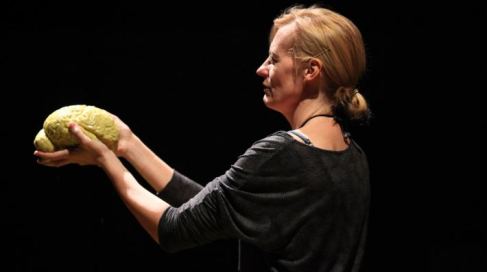Lucy Prebble’s new play, The Effect (directed by Rupert Goold), is based around an existential question – if our perception of the world is predicated on the chemical composition of the brain, and if medical science can alter this composition, then how can we trust our experiences? Do psychoactive drugs, such as antidepressants, change “who we are”?
This question sets up for a play which engages the perennial question of psychiatry vs. anti-psychiatry, as well as exploring how ‘healthy’ psychology is characterized. Connie (Billie Piper) and Tristan (Jonjo O’Neill), both apparently neurotypical, are taking part in the trial of a new antidepressant which acts specifically on dopamine levels. As clinical psychologist Lorna (Anastasia Hille) notes, dopamine, as well as being associated with depression, is also thought to be central to the experience of falling in love – which Connie and Tristan duly do.
The first half of the play establishes the question of how much psychiatry and neuroscience actually know about the etiology of mental illness, and depression in particular. Prebble shows skill in introducing the debate between a physical, psychopharmaceutical approach (championed by brash, wheeler-dealing psychiatrist Toby (Tom Goodman-Hill)) and Lorna’s more ‘humanist’ approach in a way which is both clear and theatrically engaging. I felt the distinction between the two positions was overly sharp, as Toby’s apparent inability to accept even the possibility of situational causes for depression seemed ludicrously extreme, promoting a popular anti-psychiatry which can be potentially harmful.
This simplistic picture is shattered in the second half. Both Lorna and Toby are shown to be motivated by personal romantic history as much as professional scientific conviction in their positions, while Connie and Tristan’s relationship spirals out of control due to Connie’s concern that, if one of them is on a placebo, their experience of love may be somehow false. It takes Tristan’s accidental overdose on the drug, a result of misunderstandings arising from a complex interaction of interpersonal relationships and scientific method, to reveal the play’s raw emotional core, raising it from an entertaining ‘issue play’ to a psychologically draining piece of theatre.
Anastasia Hille’s depiction of Lorna’s own depressive episode is almost frighteningly well-observed. In a grim parody of Toby’s monologue, which extols the virtues of medication and a purely empirical view of brain function, she uses a pickled brain as a puppet, ventriloquising the negative thoughts which characterize depression as she moves the two hemispheres of the brain like lips: “You should have done it years ago. You’ll never get the courage now,” “Even the people who love you, hate you, because you’re hurting the person they love.”

Source: http://www.nationaltheatre.org.uk/shows/the-effect?play=2,
Photo: Ellie Kurtz
The comic absurdity of the stage picture amplifies the sheer bleakness of Lorna’s state of mind in a way which is both brutal and beautiful. Her comment “I’ll put pants on, and we’ll take it from there” rings particularly true for many who have suffered from depression, and the image of her lying foetal and motionless in bed provides a realist antidote to the more common hystericised images of mental illness which masquerade as naturalism.
The Effect gains its power from its eventual recognition both that the results of clinical antidepressant trials are inconclusive and often manipulated (the play’s microsite http://theeffectplay.com/ cites Ben Goldacre’s Bad Pharma as a source), and that, despite this lack of evidence, antidepressants do have positive effects for many who suffer depression. Whether this result is a placebo effect or not (Lorna notes that ‘the history of medicine is the history of the placebo effect, as we know now that very little of it works’), a blanket condemnation of medication, Prebble suggests, is as dangerous as the risk of overprescription.